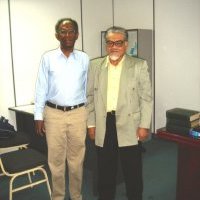Arena Wati's (1925-2009) Armageddon trilogy compares Western business culture with that of Southeast Asia. Profound cultural differences create business people with incompatible moral and personal agendas. Western business assumes that... more
Arena Wati's (1925-2009) Armageddon trilogy compares Western business culture with that of Southeast Asia. Profound cultural differences create business people with incompatible moral and personal agendas. Western business assumes that trade requires destructive conflict to sustain itself while the Southeast Asian modelseeks competition, growth and partnerships between and among buyers and sellers. Arena has frequently used his novels and short stories to portray and critically discuss social problems. Social science ideas form an important narrative subtext throughout this trilogy. Arena thought of Armageddon as an epitaph to his long literary career. Arena Wati's Armageddon trilogy compares the Western business culture with that of Southeast Asia. Their profound differences reflect traditions that create business people with different moral and personal agendas. The Western style assumes that trade requires destructive conflict to sustain itself while the Southeast Asian style seeks competition, growth and partnerships between and among buyers and sellers. 1 Arena has frequently used his novels and short stories to portray and critically discuss social problems. Social science ideas form an important narrative subtext throughout this trilogy. This long story considers events leading up to the tragedy of September 11, 2001. Arena thinks of it as an epitaph to his long career as writer. 2 The focus is not on any village setting and many of the sensual and sentient details of life are hardly noticed. He sets Armageddon almost completely in the world of high finance, among some of its major players. Arena wants to write works that are relevant to the processes of history and culture in his own era. In this essay I will give a summary of the story line and its relationships to the social sciences. I will also look at the trilogy as anthropology, a kind of novelistic ethnography in which the author becomes an interviewer and his characters are his fieldwork subjects and informants. They speak to each other but their thoughts in interior monologs often resemble ethnographic commentary. This trilogy presents an Asian perspective on world events that is unlikely to change very quickly. The characters show great distrust for the West and its mass media, particularly with its assumptions about non-Western peoples, whom it claims to wish to help. The Armageddon trilogy offers a bold commentary on the world system as it operates under the influence of power brokers active in the worlds of business and government. A clash between two shipping magnate families allows him to contrast two styles of large family business enterprises and their interaction with the political systems around them. Frictions between the Wang family, featured in Mandala (vol. 1), and the Hashmon family, featured in Menorah (vol. 2) , show one how the business style of much of East Asia contrasts with that of the West. The modern Chinese corporation is deeply rooted in the history of China and in ancient Chinese values enriched by its ties with Southeast Asian peoples. The second volume discusses MIETCO, a Western corporate empire controlled by the Hashmon family, whose roots are
Research Interests:
Research Interests:
Research Interests:
Abstract Banl<s 'David SUNY at Buffalo Arena Wati 's (1925-2009) Armageddon trilogy compares Western business culture with that of Southeast Asia. Profound cultural differences create business people with incompatible moral and... more
Abstract
Banl<s 'David
SUNY at Buffalo
Arena Wati 's (1925-2009) Armageddon trilogy compares Western business culture with that of Southeast
Asia. Profound cultural differences create business people with incompatible moral and personal agendas.
Western business assumes that trade requires destrucTive conflict to sustain itself while the Southeast Asian
mode/seeks competition, growth and partnerships befl.1!een and among buyers and sellers. Arena has
frequently used his novels and short stories to portray and critically discuss social problems. Social science
ideas form an important narrative subtext throughout this trilogy. Arena thought of Armageddon as an
epitaph to his long litermy career.Abstract
Banl<s 'David
SUNY at Buffalo
Arena Wati 's (1925-2009) Armageddon trilogy compares Western business culture with that of Southeast
Asia. Profound cultural differences create business people with incompatible moral and personal agendas.
Western business assumes that trade requires destrucTive conflict to sustain itself while the Southeast Asian
mode/seeks competition, growth and partnerships befl.1!een and among buyers and sellers. Arena has
frequently used his novels and short stories to portray and critically discuss social problems. Social science
ideas form an important narrative subtext throughout this trilogy. Arena thought of Armageddon as an
epitaph to his long litermy career.
Banl<s 'David
SUNY at Buffalo
Arena Wati 's (1925-2009) Armageddon trilogy compares Western business culture with that of Southeast
Asia. Profound cultural differences create business people with incompatible moral and personal agendas.
Western business assumes that trade requires destrucTive conflict to sustain itself while the Southeast Asian
mode/seeks competition, growth and partnerships befl.1!een and among buyers and sellers. Arena has
frequently used his novels and short stories to portray and critically discuss social problems. Social science
ideas form an important narrative subtext throughout this trilogy. Arena thought of Armageddon as an
epitaph to his long litermy career.Abstract
Banl<s 'David
SUNY at Buffalo
Arena Wati 's (1925-2009) Armageddon trilogy compares Western business culture with that of Southeast
Asia. Profound cultural differences create business people with incompatible moral and personal agendas.
Western business assumes that trade requires destrucTive conflict to sustain itself while the Southeast Asian
mode/seeks competition, growth and partnerships befl.1!een and among buyers and sellers. Arena has
frequently used his novels and short stories to portray and critically discuss social problems. Social science
ideas form an important narrative subtext throughout this trilogy. Arena thought of Armageddon as an
epitaph to his long litermy career.
